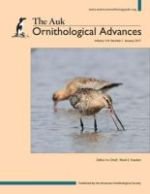The American Ornithologists' Union is deeply honored to present the 2016 William Brewster Memorial Award and medal to Dr. Patricia Parker, the Des Lee Endowed Professor of Zoology at the University of Missouri-Saint Louis (UMSL) and a senior scientist at the Saint Louis Zoo.
Parker has produced an exceptional, long-term body of work on birds of the Western Hemisphere. Her first two decades of research emphasized studies of behavioral ecology in vultures, wrens, ravens, and other birds. In the past twenty years, her research program evolved to develop extensive basic and applied studies of conservation and evolution of terrestrial and sea birds, and their parasites and pathogens, in the Galápagos Islands. Parker has also been a pioneer and leading expert in the creative application of DNA analyses in both these arenas of ornithology, having contributed to the development of methods of DNA assessment of kinship and parentage (DNA fingerprinting, microsatellites) in the 1980s and 1990s, and then to methods of pathogen and parasite diagnostics in birds during the past two decades. She is well known as a capable and supportive collaborator, colleague, and advisor.
Parker has contributed more than 180 publications to the scientific literature, more than 85% of which are on birds or their parasites or pathogens. She has published more than 30 papers in ornithological journals, including 12 in The Auk. She has trained more than 35 graduate students, most of whom are actively engaged in ornithology and many of whom are minorities, women, and students from Latin America. In 2000, Parker moved to UMSL and the Saint Louis Zoo, where she also served as chair of the Department of Biology from 2002 to 2005. Parker's joint position with the zoo has provided important opportunities to expand her research program in conservation and animal management. She played an important role in developing the Wildcare program and other collaborative research programs at the zoo.
She received her B.S. and Ph.D. from the University of North Carolina. Her early career included positions at Purdue and Ohio State universities. The first two decades of her research program largely involved studies of the behavior of birds, in particular the factors that affect sociality and mating systems. In her dissertation work she discovered that Black Vultures are genetically monogamous and use roosting sites to gain information on food locations by following other individuals. She then developed, with Kerry Rabenold and other collaborators, a groundbreaking research effort using molecular markers to assess the patterns of relatedness and parentage in the cooperatively breeding Striped-backed Wren in Venezuela. She expanded her behavioral research to many other avian taxa, from juncos and ravens to titmice, Mexican Jays, manakins, and Arabian Babblers, and at the same time developed a more limited number of projects on nonavian species, including spiders, cichlids, turtles, and more.
An interest in the mating system of the polyandrous Galapagos Hawk led Parker to the Galápagos Islands in the early 1990s, and from there her interests began to focus as much or more on evolution, disease, and conservation of this and other species of endemic Galápagos birds. She began by studying the behavior and ecology of Galápagos seabirds (albatrosses and boobies), initially assessing patterns of parentage, but then moved on to assess distributions, origins, and impacts of a range of ectoparasites, as well as hematozoon and other protistan parasites (e.g., in the Galapagos Penguin and Flightless Cormorant). Her disease research expanded similarly to the terrestrial avifauna, including hawks, doves, flycatchers, and finches. Parker and her collaborators were able to identify a range of endemic and introduced pathogens, some of the latter posing potential threats to populations of vulnerable species (such as avian poxvirus in finches and cat-derived Toxoplasma in seabirds). In a particularly creative and novel study, Parker used ancient DNA and histological methods on Galápagos land-bird museum specimens from the California Academy of Sciences to pinpoint the timing of introduction of avian poxvirus in the Galápagos Islands to the 1890s, and also determined its phylogenetic relationships as a type of canary pox rather than fowl pox. Her continued vigilant assessments of disease and its vectors in the Galápagos are critically important to the continued survival of Galápagos birds, so that the fate that befell the Hawaiian avifauna does not recur in Darwin's workbench.
Dr. Patricia Parker, via the high quality and productivity of her research, has had impacts in the fields of avian behavior, conservation, pathology, and parasitology. The American Ornithologists' Union honors her for her significant advancement of these areas in ornithology, often through use of novel and creative methodologies, and also for her commitment to excellence in research and in training of young scientists.
Award criteria. The William Brewster Memorial Award is bestowed each year by the AOU on the author or coauthors of the most meritorious body of work on birds of the Western Hemisphere published during the 10 calendar years preceding a given AOU Annual Meeting. The award consists of a medal and an honorarium provided through the endowed William Brewster Memorial Award Fund of the AOU. The award is in honor of William Brewster, one of the founding members of the society.






